Lebanon’s premier named a new government yesterday, the presidency announced, bringing to a close more than two years of caretaker authorities.
Prime Minister Nawaf Salam said he hoped to head a “government of reform and salvation”, pledging to rebuild trust with the international community after years of economic collapse blamed on corruption and mismanagement.
His new government faces the daunting task of implementing reforms needed to unlock funding from international donors after years of crisis, overseeing a fragile Israel-Hezbollah ceasefire and rebuilding the country.
“I hope this will be a government of reform and salvation,” Salam said in a televised statement moments after his cabinet was announced.
His government will strive to “restore trust between citizens and the state, between Lebanon and its Arab surrounding, and between Lebanon and the international community”, he said.
President Joseph Aoun signed a decree “to form a government of 24 ministers”, the presidency said in a post on X.
Before the new government can exercise its powers, it needs to draft a ministerial statement that must be submitted to a confidence vote in parliament within 30 days.
Lebanon’s 128-seat parliament is mostly dominated by traditional, sectarian-based parties.
The government will hold its first session on Tuesday morning, the presidency said in a post on X.
The new government includes five women, among them Tamara Elzein, who has been secretary-general of Lebanon’s National Council for Scientific Research, and Haneen Sayed, who has worked as a specialist for the World Bank. It also includes well-known figures like Ghassan Salame, a former United Nations envoy to Libya.
Former lawmaker Yassine Jaber, who has close ties to Hezbollah ally the Amal movement, was named finance minister - a strategic portfolio long dominated by the two parties.
His naming had been leaked and criticised by some as a boon for powerful parliament speaker Nabih Berri, who heads Amal.
Long the dominant force in Lebanese politics, Hezbollah suffered losses in a war with Israel that saw its leader Hassan Nasrallah killed in a massive air strike in September. Hezbollah suffered another seismic blow with the ouster on December 8 of Bashar al-Assad in Syria, a close ally.
After more than two years of political stalemate, the weakening of Hezbollah allowed former army chief Aoun, widely believed to be Washington’s preferred candidate, to be elected president and Salam approved as his premier.
The US embassy in Beirut welcomed the government formation, adding that “the Lebanese people deserve a government that will rebuild Lebanese state institutions, fight corruption, and implement needed reforms”. A day earlier, US Deputy Special Envoy for the Middle East Morgan Ortagus warned against any Hezbollah presence in Lebanon’s new government after meeting Aoun in Beirut, saying the group was “defeated” in its war with Israel. European Union ambassador to Lebanon Sandra De Waele welcomed Salam’s “commitment that it (the government) will have a reformist agenda,” which she said is “necessary for Lebanon’s future”.
The international community has long demanded reforms to unlock financial aid after Lebanon’s economic meltdown began in 2019.

US deputy special envoy for the Middle East Morgan Ortagus meets with Lebanese Parliament Speaker Nabih Berri in Beirut yesterday.
